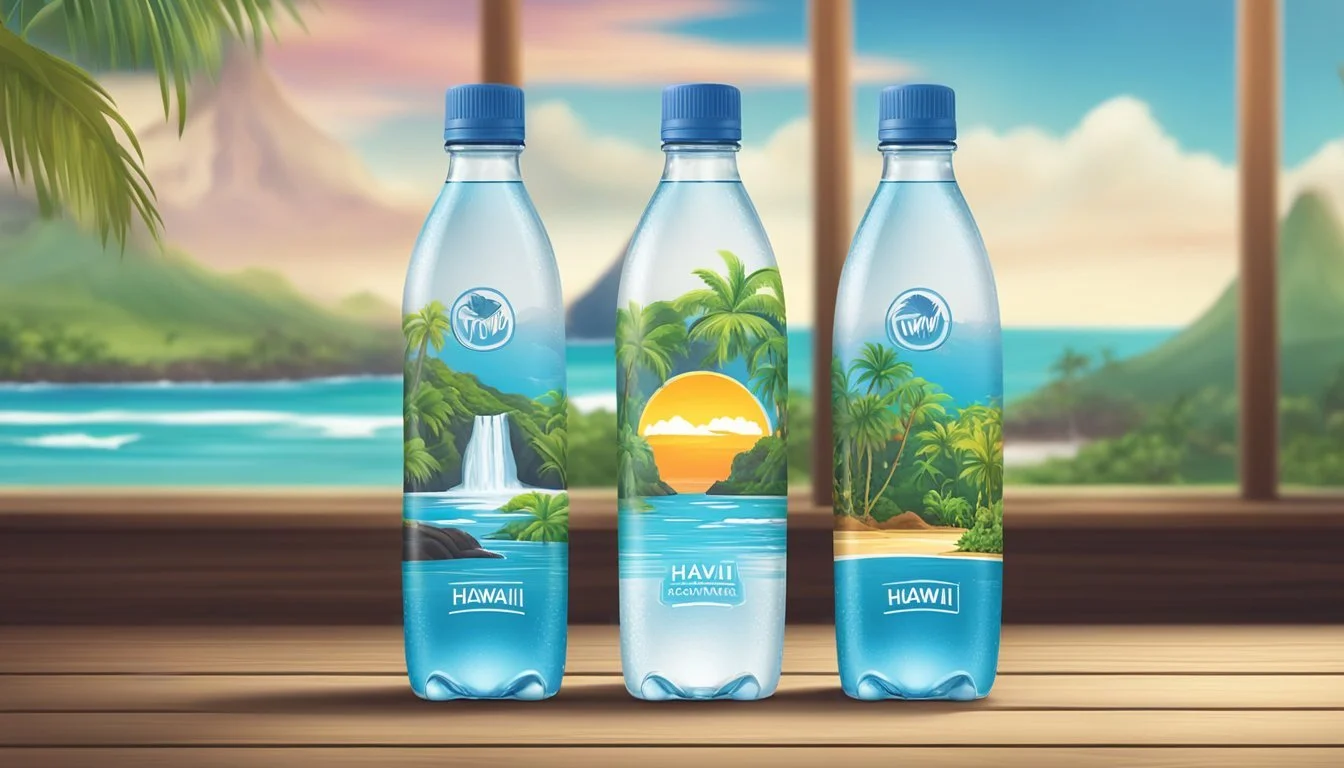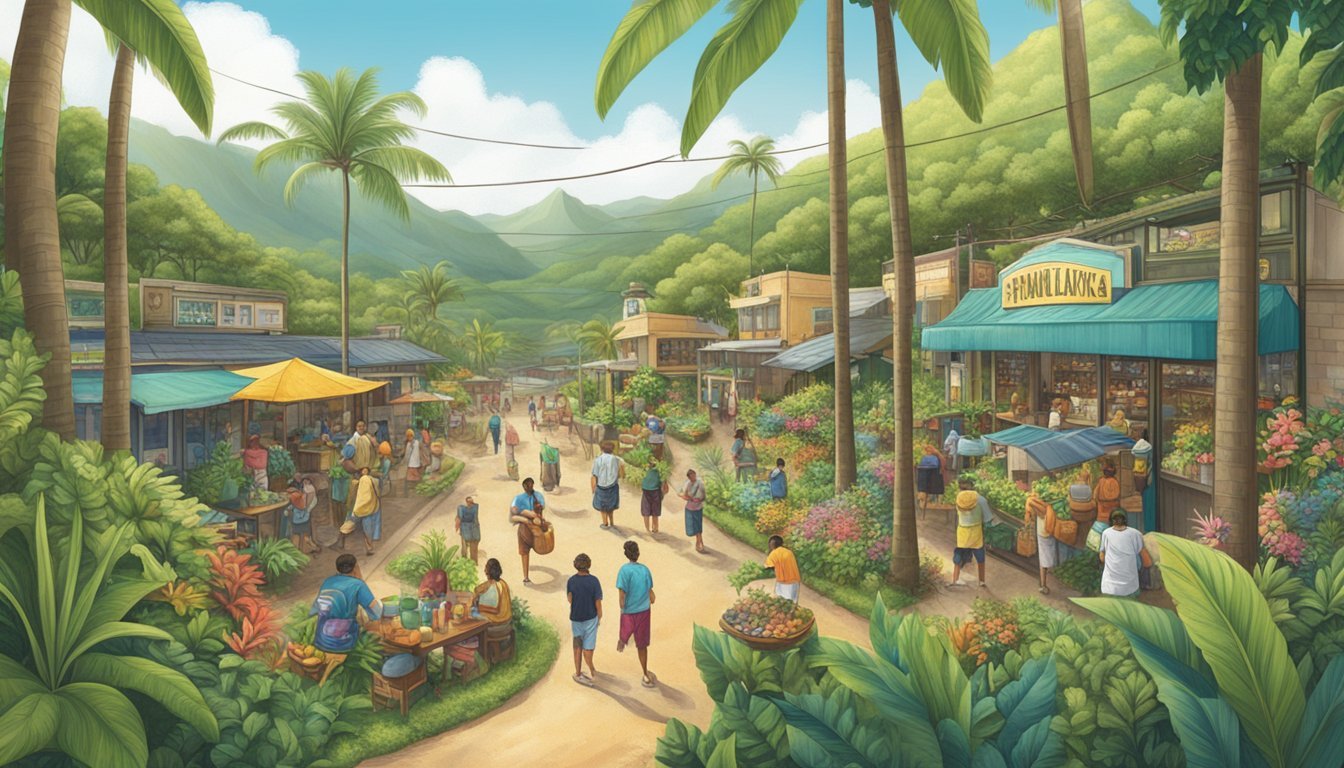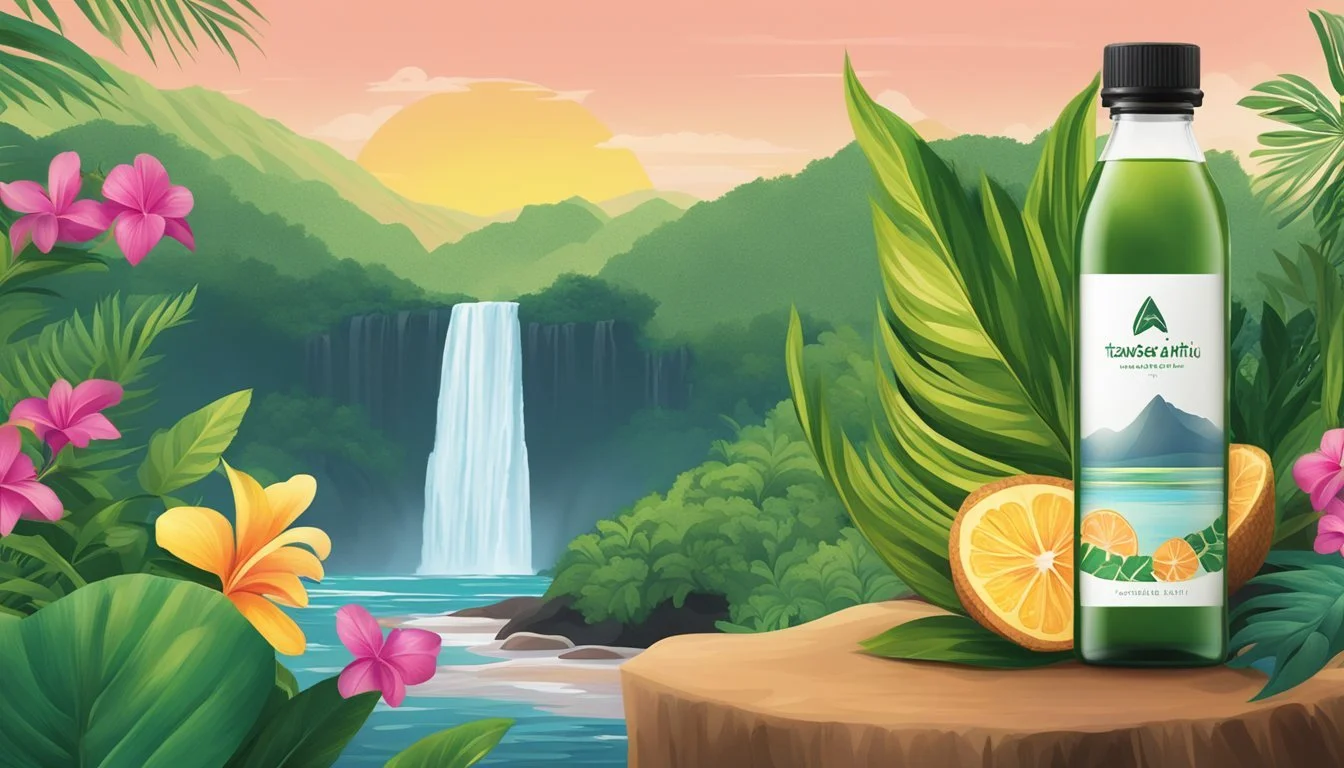Essentia vs. Hawai’i Volcanic
Which Bottled Water is Better?
Essentia and Hawai’i Volcanic are two premium bottled waters that have captured the attention of health-conscious consumers. Essentia is renowned for its advanced filtration process and high alkaline pH of 9.5, which fans claim helps maintain body balance and hydration. On the other hand, Hawai’i Volcanic offers naturally alkaline water sourced from the volcanic regions of Hawaii, boasting a unique mineral profile.
When considering which is better, it's essential to evaluate their respective benefits. Essentia's consistency in purity and taste is achieved through meticulous micro-filtration and ionization. Hawai’i Volcanic, with its naturally occurring minerals and pristine source, appeals to those who prefer a more natural approach.
Both brands have their merits, but the choice ultimately depends on personal preference and individual health goals. Some may prioritize Essentia’s cutting-edge filtration for its reliability and high pH, while others might favor Hawai’i Volcanic for its natural mineral content and volcanic origins.
Comparing Essentia and Hawai’i Volcanic Water
Essentia and Hawai’i Volcanic Water stand out for their unique sourcing and filtration methods. Both brands emphasize purity, taste, and potential health benefits.
Brand Overview: Essentia And Hawai’i Volcanic
Essentia is widely recognized for its high pH level of 9.5, categorizing it as alkaline ionized water. This brand uses a multi-step process, including micro-filtration, reverse osmosis, and ultraviolet exposure, to achieve 99.9% purity. The water is then infused with electrolytes for taste and health benefits.
Hawai’i Volcanic Water is sourced from the Big Island of Hawai’i, leveraging a natural filtration process through volcanic rock. This process adds a unique mineral content, giving it a distinct taste and vital nutrients. The brand emphasizes sustainability and environmental conservation in its bottling and packaging practices.
Source and Origin
Essentia’s water undergoes rigorous purification. The multi-step filtration process ensures the water is free from contaminants. Additionally, by producing alkaline water, Essentia aims to provide hydration that supports overall well-being.
Hawai’i Volcanic Water, sourced from deep wells on the Big Island, benefits from the natural filtration through layers of volcanic rock. This process naturally enriches the water with essential minerals and delivers a refreshing, clean taste. The brand’s focus on environmental responsibility adds another layer of appeal for eco-conscious consumers.
Health and Hydration
Both Essentia and Hawai’i Volcanic bottled waters offer unique benefits related to health and hydration. This section explores the pH levels and mineral content to understand their impact on hydration efficiency and overall health benefits.
pH Levels and Alkalinity
Essentia water boasts a higher pH level of 9.5, making it an alkaline water. Alkaline water proponents believe it can help maintain the body's pH balance and provide enhanced hydration. This higher pH is achieved through a proprietary process of ionization and purification.
Hawai’i Volcanic, sourced from natural volcanic springs, also provides a naturally alkaline pH level but focuses on the natural benefits of volcanic activity. The natural source is often highlighted as a key factor in providing hydration benefits.
Mineral Content and Health Benefits
Essentia includes added electrolytes such as magnesium, calcium, and potassium to enhance taste and hydration efficiency. These minerals are essential for various bodily functions, including bone health, muscle function, and maintaining proper fluid balance.
Hawai’i Volcanic offers natural mineral content from volcanic rock filtration, which provides a unique mix of electrolytes and minerals. The water’s journey through volcanic rock may enhance its mineral profile, contributing to its distinct taste and hydrating qualities.
Sustainability factors may also differ, with natural sources potentially emphasizing environmentally responsible practices. These elements can influence a consumer's choice based on their health priorities and preferences for natural versus ionized water.
Both waters provide health benefits, focusing on their specific mineral content and pH levels, which can cater to different hydration needs and preferences.
Purity and Quality
Purity and quality are critical factors when comparing bottled water brands like Essentia and Hawai’i Volcanic. Each brand employs distinct methods for ensuring the highest standards in water purification and testing for contaminants.
Filtration and Purification Processes
Essentia employs a multi-step purification process that includes reverse osmosis and micro-filtration. The reverse osmosis process removes the majority of total dissolved solids and potential contaminants, resulting in highly purified water. Post-purification, the water is ionized to enhance its pH, reaching an alkaline level of 9.5.
Hawai’i Volcanic, on the other hand, sources its water from pristine volcanic springs. This natural filtration process utilizes volcanic rock to filter the water naturally. This process helps retain beneficial minerals while ensuring the water remains pure and free from synthetic contaminants.
Testing for Contaminants
Both brands prioritize rigorous testing to ensure purity. Essentia's water undergoes frequent testing for potential contaminants like heavy metals, bacteria, and chemical residues. These tests confirm that the water meets stringent health standards, ensuring safety and quality for consumers.
Hawai’i Volcanic also conducts regular contaminant testing, leveraging the natural filtration through volcanic rock. Their water is checked for a variety of potential impurities, including total dissolved solids and microbial contamination. The results consistently show high purity levels, reflecting the effectiveness of their natural filtration process.
Environmental and Community Impact
Essentia and Hawai’i Volcanic take different approaches to sustainability and community support, each with its strengths and challenges. Their packaging choices and overall environmental footprint are critical aspects for consideration.
Sustainable Practices and Community Initiatives
Essentia Water emphasizes its commitment to the planet through various community initiatives and sustainability practices. They participate in recycling programs and support clean drinking water projects in underserved areas. However, they still use PET plastic bottles, which contain BPA, raising some concerns about their long-term environmental impact and health implications.
Hawai’i Volcanic focuses heavily on community and environmental stewardship. They engage in reforestation projects in Hawaii and promote sustainable farming practices. Their water is sourced sustainably, and a portion of their profits supports local Hawaiian communities. Their commitment to reducing plastic usage is evident through innovative packaging solutions.
Packaging and Environmental Footprint
Essentia predominantly uses PET plastic bottles, known for their durability but also their environmental drawbacks. Plastic bottles can take hundreds of years to decompose and contribute significantly to plastic pollution. Despite efforts to encourage recycling, the presence of BPA in plastics remains a concern.
Hawai’i Volcanic employs more environmentally friendly packaging alternatives. They aim to minimize their carbon footprint with lightweight bottles and fewer emissions during transportation. Their packaging is free from harmful chemicals like BPA. Additionally, they explore plant-based and boxed water options, aligning with their environmental ethos.
Both brands face challenges in balancing convenience with ecological responsibility, but their initiatives reflect a growing awareness in the industry.
Taste and Aesthetic
Essentia and Hawai’i Volcanic differ significantly in taste profile and branding, which influences consumer preferences. Both waters strive to provide a unique drinking experience, but they achieve this in distinct ways.
Flavor Profile and Aesthetic Experience
Essentia water is known for its smooth, clean taste. It undergoes micro-filters, reverse osmosis, and ultraviolet exposure to reach 99.9% purity. This rigorous process, combined with the addition of electrolytes, creates a neutral yet crisp flavor profile. The high pH of 9.5 or higher contributes to a slightly alkaline taste, which some consumers find refreshing and invigorating.
In contrast, Hawai’i Volcanic offers a different experience. Sourced from volcanic springs, it retains natural minerals that give it a subtle, earthy flavor. The branding emphasizes the natural, pristine origins, enhancing the overall aesthetic appeal. The water has a lower pH compared to Essentia, providing a more neutral taste that aligns closely with pure, natural spring water.
Consumer Reviews and Preferences
Consumer reviews highlight distinct preferences for each brand. Essentia receives praise for its consistency and the perceived health benefits of its high pH and added electrolytes. Many consumers appreciate the smooth taste and reliable quality, considering it a premium option for hydration.
Hawai’i Volcanic garners attention for its unique source and mineral content. Reviews often mention the refreshing and natural taste, with some consumers favoring the subtle flavor nuances provided by the volcanic minerals. The aesthetic appeal of the branding, which emphasizes purity and nature, attracts those looking for an authentic and premium experience.
Each brand has its loyal following based on taste preferences and the overall drinking experience they offer.
Economic Considerations
In evaluating Essentia and Hawai’i Volcanic, key factors include the price points, perceived value, accessibility, and convenience of obtaining these bottled waters.
Price Comparison and Value
Essentia typically retails at about $1.50 per 16.9 oz bottle. It undergoes extensive filtration processes, including reverse osmosis and UV exposure, which adds to its production cost.
Hawai’i Volcanic often costs around $2.00 per 16.9 oz bottle. Sourced from volcanic springs in Hawaii, it boasts a unique natural filtration process, which is reflected in its premium pricing.
Brand Price (16.9 oz) Unique Selling Point Essentia $1.50 Advanced filtration and alkalinity Hawai’i Volcanic $2.00 Natural volcanic spring water
The higher price of Hawai’i Volcanic might be justified by the exotic sourcing and natural filtration, whereas Essentia's value comes from its advanced purification process.
Accessibility and Convenience
Essentia is widely available in supermarkets, convenience stores, and online platforms. The brand has established strong distribution channels, ensuring that customers can easily purchase it from various locations.
Hawai’i Volcanic water has a more niche distribution. While it is available online, it might not be as commonly found in physical stores outside of specialty shops and upscale grocery stores. This potentially limits its convenience for everyday consumers.
Essentia’s broader distribution network makes it more accessible for the average consumer. Hawai’i Volcanic's uniqueness might appeal more to those seeking a premium product, despite its limited availability.
In either case, both waters cater to different consumer preferences regarding price, value, and purchasing ease.
More About Essentia
Essentia vs Cascade Mountain: Which Bottled Water is Better?
Essentia vs Hawaiian Springs: Which Bottled Water is Better?
Essentia vs Icelandic Glacial: Which Bottled Water is Better?
Essentia vs Kirkland Signature: Which Bottled Water is Better?
Essentia vs Mountain Valley Spring Water: Which Bottled Water is Better?
Essentia vs Nestle Pure Life: Which Bottled Water is Better?
Essentia vs Richard's Rainwater: Which Bottled Water is Better?
Essentia vs Talking Rain AQA: Which Bottled Water is Better?
Essentia vs Whole Foods Italian Still Mineral water: Which Bottled Water is Better?
More About Hawai’i Volcanic
Acqua Pana vs Hawaii Volcanic: Which Bottled Water is Better?
Antipodes vs Hawaii Volcanic: Which Bottled Water is Better?
Aqua Carpatica vs Hawaii Volcanic: Which Bottled Water is Better?
Arrowhead vs Hawaii Volcanic: Which Bottled Water is Better?
Boxed Water vs Hawaii Volcanic: Which Bottled Water is Better?
Castle Rock vs Hawaii Volcanic: Which Bottled Water is Better?
Core Hydration vs Hawaii Volcanic: Which Bottled Water is Better?
Deer Park vs Hawaii Volcanic: Which Bottled Water is Better?
Hawaii Volcanic vs 1907water: Which Bottled Water is Better?
Hawaii Volcanic vs Alkaline88: Which Bottled Water is Better?
Hawaii Volcanic vs Big Chill: Which Bottled Water is Better?
Hawaii Volcanic vs BodyArmor: Which Bottled Water is Better?
Hawaii Volcanic vs Cascade Mountain: Which Bottled Water is Better?
Hawaii Volcanic vs CBD Living: Which Bottled Water is Better?
Hawaii Volcanic vs Crystal Geyser: Which Bottled Water is Better?
Hawaii Volcanic vs Crystal Lake: Which Bottled Water is Better?
Hawaii Volcanic vs Essence pH10: Which Bottled Water is Better?
Hawaii Volcanic vs Kirkland Signature: Which Bottled Water is Better?
Hawaii Volcanic vs Liquid Death: Which Bottled Water is Better?
Hawaii Volcanic vs Open Water: Which Bottled Water is Better?
Hawaii Volcanic vs Proud Source: Which Bottled Water is Better?
Hawaii Volcanic vs Pure Life: Which Bottled Water is Better?
Hawaii Volcanic vs Purely Sedona: Which Bottled Water is Better?
Hawaii Volcanic vs Richard's Rainwater: Which Bottled Water is Better?
Hawaii Volcanic vs Simple Truth: Which Bottled Water is Better?
Hawaii Volcanic vs Talking Rain AQA: Which Bottled Water is Better?
Hawaii Volcanic vs Weird Water: Which Bottled Water is Better?
Hawaii Volcanic vs Whole Foods 365: Which Bottled Water is Better?
Hawaii Volcanic vs Whole Foods Italian Still Mineral water: Which Bottled Water is Better?
Hawaiian Springs vs Hawaii Volcanic: Which Bottled Water is Better?
Ice Mountain vs Hawaii Volcanic: Which Bottled Water is Better?
Icelandic Glacial vs Hawaii Volcanic: Which Bottled Water is Better?
Just Water vs Hawaii Volcanic: Which Bottled Water is Better?
Mountain Valley Spring Water vs Hawaii Volcanic: Which Bottled Water is Better?
Nestle Pure Life vs Hawaii Volcanic: Which Bottled Water is Better?
Poland Spring vs Hawaii Volcanic: Which Bottled Water is Better?
San Pellegrino vs Hawaii Volcanic: Which Bottled Water is Better?
Smartwater vs Hawaii Volcanic: Which Bottled Water is Better?
Solan de Cabras vs Hawaii Volcanic: Which Bottled Water is Better?
Topo Chico vs Hawaii Volcanic: Which Bottled Water is Better?
Zephyrhills vs Hawaii Volcanic: Which Bottled Water is Better?








